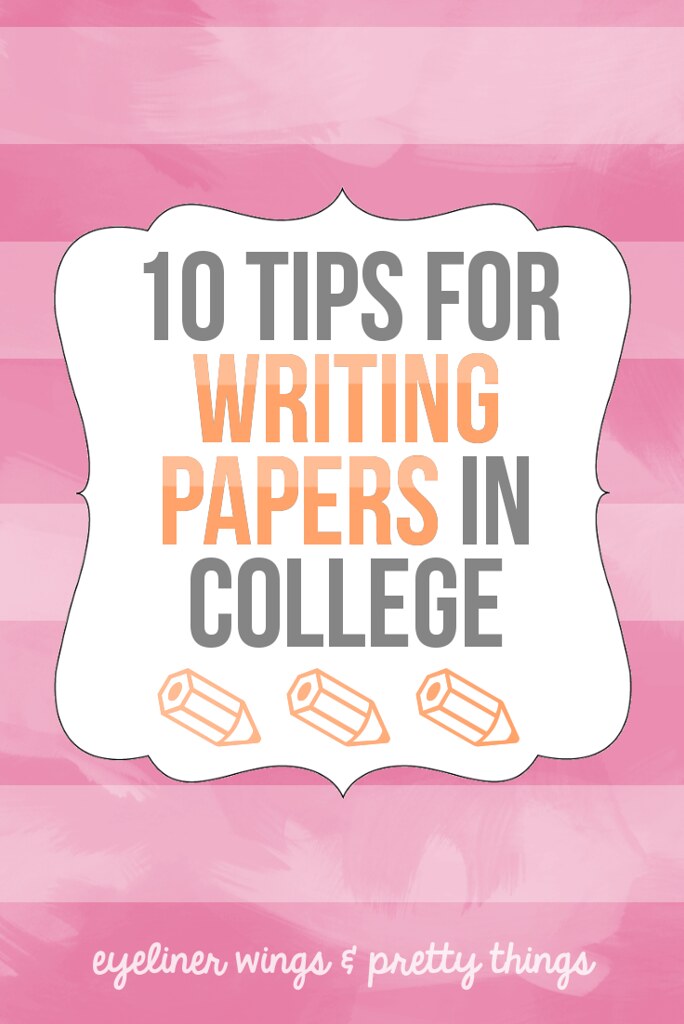I’m a journalism major, which means writing is my dream, my hobby, my passion and my main focus of study. I’ve have had all things writing hammered into my brain for years and I’ve been hammering these things into the heads of others for years, too– I work at my college editing and revising papers.
Honestly, I don’t know how the heck I haven’t written this post yet. In college you’re definitely going to be writing a lot of papers, even if you have a math major you’ll definitely have to write papers at least once. I can’t write your papers for you, and writing papers in college can be difficult, but I can give you tips for writing papers in college that might just help you get straight A’s.
1. Make an outline.
Before starting your paper, figure out what exactly you’re trying to say. There are a lot of different types of papers; they’ll vary based on what type of paper it is and what you prefer.
- Main Points – This format is just a list of the main points you wish to establish in the order of how you are going to present them.
- Detailed – This format is a list of each paragraph’s main points and the sub points or sources you plan on including with in those.
There’s also the method I often use which is Just start writing. The majority of people don’t function well with this because it can lead to a messy paper, but when you just start writing and then come back and do touch-ups and organize the paper, it can work as well.
2. Use the proper format.
If you don’t know how to use MLA or APA or Chicago or whatever format your professor has requested your paper be written in, look it up. This is the 21st century and we have the internet. You can easily Google “APA sample paper” to figure out cover pages and other format details. This is a bad thing to lose points on because it’s something you could’ve easily figured out with minimal effort
3. If you’re going to use EasyBib or some other online citation maker, input your data correctly.
These are usually perfectly fine but there’s a little caveat. DO NOT use the ones already in the system. If you search your journal or book and it pops up that someone’s done it already, do not use that one. Any idiot could’ve created that.
I’m not even telling you not to use these generators because they’re really helpful, especially for very long papers. Input the data yourself and make sure it’s as accurate as possible and you provide as much information as you can. The citation machine is only as good as what you give it.
4. Conclusions can be hard, but it’s not exactly just re-wording the introduction.
Your conclusion needs to provide some sense of closure to the reader. It should include a 1-2 word sentence about the main point you wanted to get across. If you’re stumped beyond that, try expanding the topic to a more broader sense or writing down your main points you wanted to establish in your paper and then using that to focus your conclusion.
Do not use the phrase “In conclusion.” Holy crap, nothing makes me more frustrated. This is elementary school level garbage. Having transitions is great, but don’t use this one. Please don’t use this.
Here are two of my favorite alternative words that serve the same purpose but sound way more classy and astute: Conclusively & Ultimately.
5. Have someone else read it over.
Another set of eyes is always helpful. Most colleges, like mine, offer free writing center consultations and proofreading. It will only benefit you. If you don’t have something fancy and legitimate, just go to your roommate or friend. Even if they’re not a brilliant English major, they can still notice any obvious mistakes or areas that don’t make sense.
6. Finish it early so you can come back to it.
Obviously this is not always possible, especially if you’ve procrastinated. If you finish your paper early, even if it’s a day early, put it aside and come back to it later on. By looking it over after taking a break you’ll be able to pick up on things you hadn’t before.
7. Print it out and edit on the hard copy.
I always notice different mistakes and find myself being more critical on a hard copy. This might not be the best way to conserve paper or whatever but it’s a good way to give your eyes a break from the computer screen and using a red pen is just fun and powerful. Seriously, just give yourself a red pen and go ham.
8. When you use a quote, follow up with explanations.
A “source” is a resource, not just something you copy and paste crap out of to make your paper more astute. Make sure you actually understand your sources because after you quote them, you need a sentence of your own words that explains the quote or its relevance to your paper. You should also introduce the quote, not just place it in the smack dab middle of your paragraph. You can introduce it by saying:
According to *TEXT OUR AUTHOR*,”QUOTE.”
This is further exemplified in the text, “QUOTE.”
Which the author explains by stating, “QUOTE.”
Those are just a few examples. Also be sure to explain or elaborate on the quote so it’s not just thrown there!
9. Don’t drown your paper in quotes.
If you have too many quotes, paraphrase and keep your citation. You’re making your own words out of information you’ve obtained, so it’s better than just copying and pasting a bunch of quotes. With this being said, don’t drown your paper in quotes.
They’re great to have, but avoid using ridiculously long ones unless they are crucial and if you have a short paper, use less quotes than you would in a longer one. If it’s all quotes, you didn’t actually write much of a paper you just kind of made a collage.
10. Craft a strong thesis.
The thesis should be towards the end or at the end of your introduction paragraph. This should be exactly what your paper is about or what you’re trying to prove or going to discuss. Ideally, this should be written before you write your paper so you know what the heck you’re writing about. Even if you want to save your introduction for last because it’s oftentimes the hardest part, at least write your thesis so you have a specific idea of what direction your paper is going in. The vast majority of professors have “strong and clear thesis” as one of their rubric grading points, so make sure you make a good one.
Basically, I like to view a thesis as what the writer is trying to get the reader to believe or stand behind. What are you telling me? What’s your stance? Avoid using “I” in this unless the professor gives you the green light or if it’s a personal, narrative paper.
11. For research papers or literature reviews, print and highlight your sources.
Once again, this isn’t particularly eco-friendly, BUT THIS IS ABOUT YOUR GRADES! Maybe use a reusable water bottle and recycle while you do this, whatever. Anyway. Print out all of your sources and then choose different highlighter colors for each point/topic/theme you’re going to discuss in your paper.
For example, if you’re doing a paper on body image and gender, you may want to use a green highlighter to highlight important or useful quotes/info about men and a yellow highlighter for info about women. Maybe you can use a pink highlighter for statistics and blue for evidence against your argument, too.
This helps you organize your resources so when you’re writing you can more easily find which information you need to use or can incorporate. Seriously, this saves a lot of time in the long run. You won’t be flipping aimlessly through a dozen academic journals searching for that one quote.
12. Go to office hours.
If you have a question about something specific about the content of your paper, format of your paper, sources you can use or literally anything go to office hours with your paper and a specific question. Most professors don’t mind answer questions, especially if you know exactly what you need to ask. You can always e-mail your professor, but it’s more personal if done face to face and it also shows that you care about your work just a little bit more.
Literally, better to be safe than sorry. On the other hand, if your professor is a little bit of a crusty fellow who doesn’t answer questions or is still really vague, try reaching out to your classmates to see what they’re doing. It might help you feel a little more calm if they’re on the same page.
13. Break it up.
Doing a ten page research paper with four subtopics and fifteen sources is a very intimidating task and you might procrastinate it because you don’t feel like jumping head first into that. This could lead to writing a paper the night before and while that does work for some, for many that’s just not a good strategy.
To avoid this, break up your paper into steps. Maybe 14 days before you can look up all of your sources. Thirteen days before you can highlight and read the sources. Ten days before you can write one subtopic and so on. Breaking up the paper can make it a little bit less intimidating and you might be more likely to get it done sooner so you have more time to allocate to editing and getting a second opinion.
Related Read: How to Write Papers in College That Stand Out
What are your favorite tips for writing papers in college?







